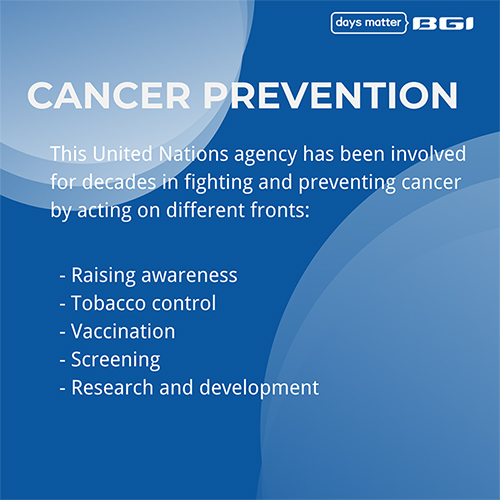Celebrating the Past and Shaping the Future: The WHO at 75 - BGI Perspectives
2023-04-05
April 7th marks the World Health Organization's 75th anniversary. Since its establishment in 1948, WHO has been at the forefront of promoting health for all around the world. Through its work on disease prevention, health emergencies and achievement, this agency headquartered in Geneva has had a significant impact on worldwide health outcomes.
WHO's Importance
As the leading international organization responsible for the coordination of global public health, WHO's primary role is to provide leadership on matters related to health and to set global standards.
The WHO's mandate covers a wide range of issues, including infectious diseases, non-communicable diseases, mental health and at its core also covers maternal health and perinatal care across the globe. The Maternal Health Unit (MAH) provides leadership for improving maternal and perinatal health and well-being and ending preventable maternal mortality.
BGI Genomics fully supports WHO's objectives and efforts for offering a globally democratized, safe maternal care. Detecting a disease at an early stage can enable appropriate and timely medical intervention before more serious and sometimes irreversible health issues are caused. BGI NOVA™ Newborn Genetic Screening Test determines a baby's risk for 246 genes associated with 112 genetic diseases, including 254 disease subtypes.
Health for All
The WHO actively promotes global health equity. This organization works to ensure that everyone, regardless of their location or socioeconomic status, has access to quality health services. This is vital in developing countries, where access to healthcare is often limited.

Preventing cancer is one of
the numerous endeavors BGI Genomics shares with the Geneva based organization.
One of the common battlegrounds is cervical cancer.
On the occasion of International HPV Awareness Day, Senior Product Manager Zhang Lin shared insights on why a combination of screening and vaccination is essential is preventing cervical cancer. HPV DNA-based testing has a 95% accuracy rate which is much higher than Pap smears' 80-90%. HPV testing is an objective diagnostic, unlike Pap smears that rely on visual inspection which is more prone to human errors.
It is no coincidence that in its guidelines for screening and treatment of cervical precancer lesions, WHO recommends HPV tests like BGI Sentis ™ over Pap smears for cervical cancer prevention.

Fighting viruses and infectious
diseases

WHO has also been instrumental in
advancing the field of public health research. Additionally, it plays a
critical role in promoting the use of evidence-based interventions and best
practices in healthcare. Working on disease surveillance, the epidemiology
division has helped to identify new disease outbreaks, crafted effective
response strategies and vaccines development for infectious diseases such as
Ebola and SARS and viruses like Covid-19 and Monkeypox.

BGI Genomics Monkeypox Virus Nucleic Acid Detection Kit receive CE-IVDD certification
Challenges and achievements
The recent COVID-19 pandemic has put immense pressure on the organization, which had to coordinate a global response to the crisis while navigating complex political and social dynamics.
Despite these setbacks, WHO has continued to play a critical role in addressing global health issues and its role in COVID-19 has been pivotal in providing guidance and support to countries around the world. General Director Dr. Tedros Adhanom Ghebreyesus has repeatedly stressed the necessity of addressing ongoing health challenges, such as mental health.

The future of the World Health
Organization will be shaped by various factors and priorities:
Leveraging technology such as artificial intelligence, big data, and telemedicine, offers new opportunities for this organization to improve health outcomes and reach underserved populations. WHO will need to stay abreast of these advances and work to ensure that they are deployed in an ethical and equitable manner.
WHO will need to continue its efforts in strengthening health systems, particularly in low- and middle-income countries. This will involve working with governments, civil society, and the private sector to build resilient health systems and public care that can deliver high-quality care to all individuals.
WHO will need to prioritize promoting health equity and reducing health disparities between and within countries. This will involve addressing social determinants of health, such as poverty, education, and housing, and ensuring that all individuals have access to essential health services.
In short, a multitude of challenges lies ahead. Agile and forward-thinking leadership, effective communication and constant critical thinking will be critical assets in allowing WHO to play a vital role in shaping the future of global health and contribute to its betterment.
About BGI Genomics
BGI Genomics, headquartered in Shenzhen China, is the world's leading integrated solutions provider of precision medicine. Our services cover over 100 countries and regions, involving more than 2,300 medical institutions. In July 2017, as a subsidiary of BGI Group, BGI Genomics (300676.SZ) was officially listed on the Shenzhen Stock Exchange.